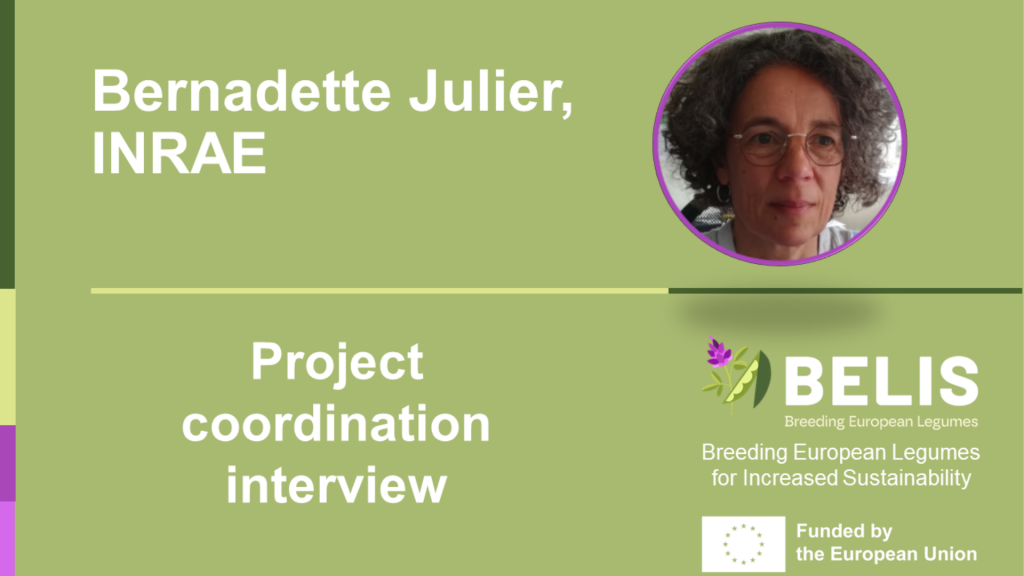«BELIS is dedicated to enhance genetic progress on legumes through technical novelties as well as improve the conditions to deliver the genetic progress to end-users.« – Bernadette Julier
Introduce yourself, your professional background and your role within the BELIS Project.
I am a geneticist, working at INRAE since 1994. My carrier is dedicated to legume crops, a group of species that is of more and more interest for agriculture sustainability and protein autonomy in Europe. It was already true in 1994 and even earlier but few people put this objective as a top priority at that time. My main interest is on perennial forage legumes, among which lucerne or alfalfa that is adapted to a large number of pedoclimatic conditions. I consider breeding as a lever that is able to fix a number of issues: productivity, quality, resistance to pests and diseases, resistance to cold or drought, adaptation to new growing conditions (in mixtures with other species for example). In combination to agronomic practices, genetics and plant breeding, aiming at producing new improved varieties, contribute to bring progress to the farms and the farmers.
I am the Project Coordinator of BELIS, meaning that I have gathered partners to define the most relevant aspects to be studied, in order to reach the ambition given by Horizon Europe on legume breeding. I am also involved in BELIS as a scientist, engaged in producing more results on the genetic control of key breeding traits in lucerne. In addition, I am working with breeders to test new breeding schemes that make use of molecular markers to speed up genetic progress.
Describe BELIS in 1 sentence.
BELIS is dedicated to enhance genetic progress on legumes through technical novelties as well as improve the conditions to deliver the genetic progress to end-users.
BELIS is made up of 34 partners from 18 countries. Describe this consortium and the role played by the different actors for the development of the project.
The consortium is composed of research institutes, some of them being also breeders, private breeders, and also three technical institutes, one registration office and one international organism in charge of education.
To reach BELIS ambition, we needed skills on different legume species, on different traits, on different technics, on different disciplines.
- We have chosen to work on many legume species, 7 used at grain legumes for feed and food, 7 used at forage legumes for feed or ecosystem services.
- The traits under study are related to yield, quality, biotic and abiotic resistances, depending on the species. We are studying new phenotyping methodologies such as remote-sensing technics based on image capture.
- Technics cover phenotyping, genotyping, detection of markers associated to traits, analysis of genetic diversity, breeding methodologies.
- Disciplines gather genetics and plant breeding, but also phytopathology, entomology, biochemistry. We have also on board economists and experts of regulations on variety rights.
Why this project is relevant: what challenges is BELIS aiming to respond to?
The European agriculture has a very poor protein autonomy, which means that Europe is importing protein from abroad (soybean meal from South America mainly) and consuming nitrogen fertilizers produced with a huge expense of fossil energy. This situation is a threat for Europe sovereignty. In Europe, the legume crops are under-utilized, mostly because the return for farmers is considered as insufficient. As a consequence, the seed industry is not very active on these species and the efforts dedicated to legume breeding are weak. The genetic gap between legume varieties and the main cash crops is thus continuously broadening.
The challenge of BELIS is to give the conditions to produce a strong genetic progress for legume crops, so that the offer in improved legume varieties is no more a limit to legume cropping.
«We expect that the legume seed sector is able to produce improved varieties for many legume crops, for food, feed and ecosystem services, to be delivered to end-users. This will enhance European autonomy for protein, contribute to crop diversification and reduce energy consumption in agriculture.« – Bernadette Julier
Describe the project’s approach, the type of solutions the project is going to work on, the disciplines involved…
A first approach is to facilitate the phenotypic and molecular breeding, by developing new protocols and testing them in “proof-of-concept” breeding programmes.
A second approach is to improve the variety registration process. We will develop and test cost-effective molecular markers to assist the Distinction-Uniformity-Stability tests. Value for Cultivation and Use tests will be conducted in a few agrizones, at a transnational level, with the objective to enhance the relevance of the evaluations of candidate varieties.
A third approach is to inform about the legume varieties available in Europe and their adaptation to different regions, including by making use to crop modelling.
Another approach is to analyze the governance and business models of the public and private breeders to identify the most promising ones. BELIS will also analyze the financing mechanisms and look for possibilities to include down-stream actors of the value chains in this support.
Finally, BELIS has also the ambition to build a network of all actors involved and interested in legume genetic progress: breeders, scientists, extension services, registration offices, seed industry, and all end-users (feed and food industry, farmer associations, consumer associations). This network, during and beyond BELIS, will be the place for dissemination, trainings, collaborations and all types of exchanges that may boost legume breeding.
BELIS was kicked-off in October 2023. Could you describe what the first steps of the project are?
It was important to all meet in persons and to build a common view of the whole project, in which each one has an important role. Partners discussed about the experiments and studies, focussing on the ones to be installed during the first year.
What may be the project’s benefits for the sector and for society in general?
We expect that the legume seed sector is able to produce improved varieties for many legume crops, for food, feed and ecosystem services, to be delivered to end-users. This will enhance European autonomy for protein, contribute to crop diversification and reduce energy consumption in agriculture.


